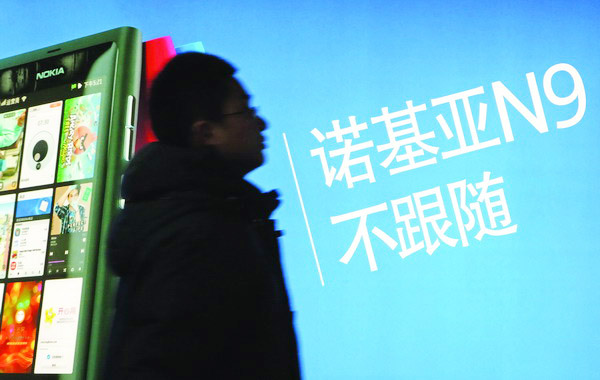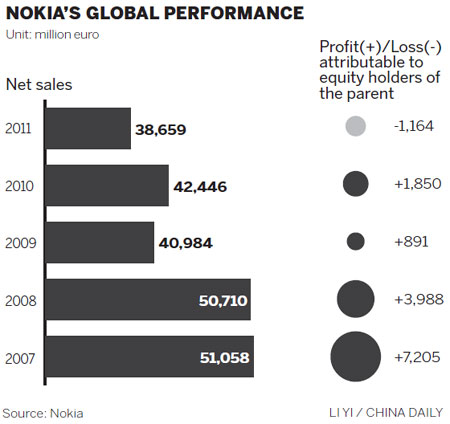Nokia presses on, making China its innovation hub
Updated: 2012-09-24 10:17
By Shen Jingting (China Daily)
|
|||||||||
The once top-selling cellphone maker pins hopes on Windows
From subways and shopping malls to chic flagship stores in Beijing, various Nokia advertisements, fronted by Chinese singers and movie stars, have been attracting people's attention. Nokia Corp, once king of the world's mobile phone industry, has been forced to make exhaustive efforts to win back customers.
Nokia is on the way to becoming the mobile phone company hiring the most Chinese stars to boost its product sales in the country. However, limited progress has been achieved since it decided to focus on smartphones running the Windows Phone operating system.
|
 The shadow of a Chinese customer on a Nokia cellphone advertisement. The company ranked fifth place with a 9.1 percent share of China's smartphone market in the first half of this year, slipping from the top position during the fourth quarter of 2011, according to a report by research firm IHS. [Photo/China Daily] |
The company ranked fifth place with a 9.1 percent share of China's smartphone market in the first half of this year, slipping from the top position during the fourth quarter of 2011, according to a report by research firm IHS. Samsung Electronics Co shipped more than double the number of smartphones than Nokia managed, gaining a market share of 20.8 percent, or 14.4 million smartphones, in the first six months of this year, the report said.
Nokia has not given up on the Chinese market. The company has pinned great hopes on its newly unveiled Nokia Lumia 920 and the Nokia Lumia 820, the first devices in Nokia's Windows Phone 8 range, to grab a bigger share in China's market - the world's largest for smartphones.
"The two phones have the ability to sync content between Windows Phone 8 smartphones, Windows 8-based PCs, tablets and the Xbox. It means files, music, pictures and video can be accessed in whatever way is most convenient," said Flann Gao, Nokia China communications manager.
Nokia has so far introduced six Lumia Windows Phone devices to the Chinese market, including the Lumia 610 and 900, plus two models dedicated to China Telecom's 3G network. Gao added that Nokia would enhance cooperation with Chinese telecom carriers and develop more customized phones.
China is also Nokia's global hub for innovation and Beijing is the only city that has both global research and development for Nokia feature phones and smartphones.
Stephen Elop, chief executive officer of Nokia Corp, said this month that China has become the world's largest Windows Phone device market.
Gao confirmed to China Daily on Sept 6 that China is the biggest single-country market for Windows Phone devices manufactured by Nokia. With 1.06 billion mobile subscriptions, China has a great potential in the global smartphone industry, he said.
"In the past year, Nokia's financial results have underperformed but, in the process of transformation, the Lumia series is becoming more popular with consumers," Gao said.
The sales volume of Nokia's Windows Phone devices is increasing. Nokia shipped 4 million Windows Phone handsets in the second quarter, doubling that of the previous quarter. According to research firm Localytics, Nokia is the world's biggest Windows Phone vendor, with a worldwide market share of 59 percent in July.
"We believe Nokia will get much better in the second half of 2012," Gao added.
However, according to industry research firm Gartner, fewer than 3 percent of smartphones sold in the second quarter ran on the Windows Phone operating system. The majority of smartphones sold worldwide were still running on Google Inc's Android operating system and Apple Inc's iOS.
"Nokia took an important step in its transition to the Windows operating system with sales of 4 million Lumia models in the second quarter," said Wayne Lam, a senior analyst at IHS.
"But that was less than half of the total number of smartphones shipped by the company during the quarter. Thus, smartphones using the legacy Symbian operating system still outsold the Lumia Windows-based phones, indicating that Nokia still has a long to go to regain its foothold in the market," Lam added.
Elop, who took the helm at Nokia in September 2010, has driven the company to be 100 percent dedicated to Microsoft's Windows Phone operating system and gradually abandon its Symbian platform.
It was a bumpy road for Elop in his journey of restoring Nokia's glory. In the first quarter this year, Samsung overtook Nokia to become the world's largest mobile phone brand. It marked the first time since 1998 that Nokia has not been the No 1 player.
Nokia's financial performance also worsened. The company's net sales fell by 19 percent to $9.22 billion year-on-year in the second quarter. The New York Stock Exchange-listed Nokia has seen its stock price plunge to $3 per share from about $40 in 2007, the year when Apple launched its first iPhone device.
It is not the first time Nokia has faced a crisis. In the 1990s the company abandoned other industries to focus solely on its mobile telecommunication business. The decision saved it from bankruptcy.
Will Elop's decision help Nokia regain its past glory? For many Chinese people who chose Nokia for their first mobile phone, they may wish a big yes.
shenjingting@chinadaily.com.cn

- Nokia sets up innovation center in Beijing
- ZTE sets sights on leading global role
- Nokia's layoff involves R&D staff
- Changes ring in the smartphone market
- Nokia to adjust operations in China
- Nokia launches Lumia smartphone with Windows OS
- Lumia fails to light the way ahead for Nokia
- Nokia tries to dial up market share

 Relief reaches isolated village
Relief reaches isolated village
 Rainfall poses new threats to quake-hit region
Rainfall poses new threats to quake-hit region
 Funerals begin for Boston bombing victims
Funerals begin for Boston bombing victims
 Quake takeaway from China's Air Force
Quake takeaway from China's Air Force
 Obama celebrates young inventors at science fair
Obama celebrates young inventors at science fair
 Earth Day marked around the world
Earth Day marked around the world
 Volunteer team helping students find sense of normalcy
Volunteer team helping students find sense of normalcy
 Ethnic groups quick to join rescue efforts
Ethnic groups quick to join rescue efforts
Most Viewed
Editor's Picks

|

|

|

|

|

|
Today's Top News
Health new priority for quake zone
Xi meets US top military officer
Japan's boats driven out of Diaoyu
China mulls online shopping legislation
Bird flu death toll rises to 22
Putin appoints new ambassador to China
Japanese ships blocked from Diaoyu Islands
Inspired by Guan, more Chinese pick up golf
US Weekly

|

|







